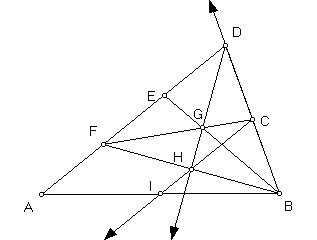- About MAA
- Membership
- MAA Publications
- Periodicals
- Blogs
- MAA Book Series
- MAA Press (an imprint of the AMS)
- MAA Notes
- MAA Reviews
- Mathematical Communication
- Information for Libraries
- Author Resources
- Advertise with MAA
- Meetings
- Competitions
- Programs
- Communities
- MAA Sections
- SIGMAA
- MAA Connect
- Students
- MAA Awards
- Awards Booklets
- Writing Awards
- Teaching Awards
- Service Awards
- Research Awards
- Lecture Awards
- Putnam Competition Individual and Team Winners
- D. E. Shaw Group AMC 8 Awards & Certificates
- Maryam Mirzakhani AMC 10 A Awards & Certificates
- Two Sigma AMC 10 B Awards & Certificates
- Jane Street AMC 12 A Awards & Certificates
- Akamai AMC 12 B Awards & Certificates
- High School Teachers
- News
You are here
Van Schooten's Ruler Constructions - Third Solution to Problem II
Finally, van Schooten presented a third solution to Problem II.
Problem II: Given a straight line with endpoints A, B, to bisect it.
Another way: Assume, as before, C is a point away from AB, and from B through C is drawn an indefinitely long line, and find on it CD equal to CB, and join it to A to form AD. Then in DA, assume DE equals DC and EF equals CB. [Here, van Schooten gives five illustrations, showing each of the following five cases: 1) DF = DA, 2) DF < DA, 3) DF > DA but DE < DA, 4) DE = DA, and 5) DE > DA. We illustrate case #2 only.)] Make BE, FC intersecting at G, then DGH cutting FB in H.
If now F falls on the point A, then the lines FB and AB coincide, and then H bisects it.
But if the point F falls beyond or within A, I say that if the line is drawn through the points C and H, it will bisect the line AB at I.

Next:
C. Edward Sandifer, "Van Schooten's Ruler Constructions - Third Solution to Problem II," Convergence (August 2010)




